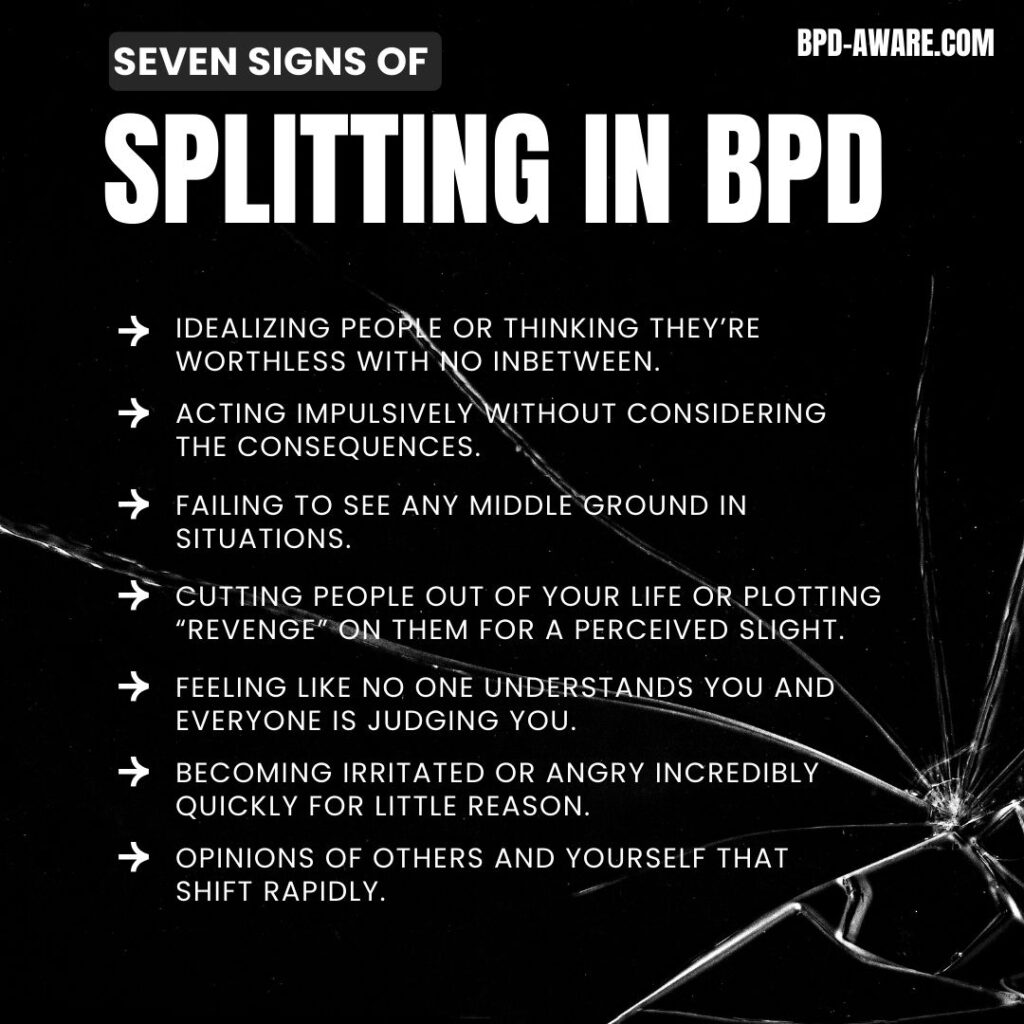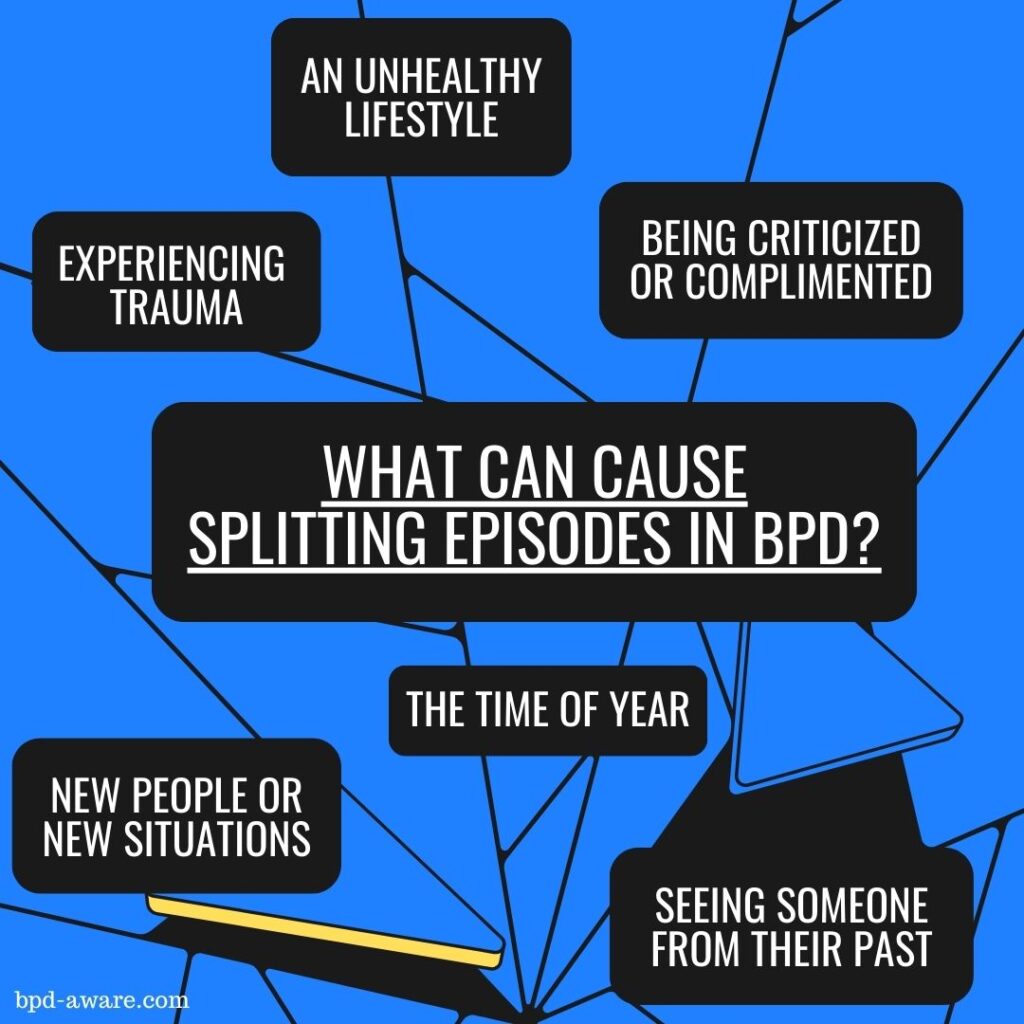One of the most common terms associated with Borderline Personality Disorder (BPD) is “splitting.” Splitting is a term used to describe the inability to hold conflicting thoughts, feelings, or beliefs. To put it simply, someone with BPD who is “splitting” is seeing things in a very “black and white” manner.
For example, they might believe that a person they know is an utter angel who can do no wrong. Conversely, someone they know might be seen as an incredibly negative influence. Splitting indicates a loss of “grey” thinking where things, people, and situations have good and bad points.
At its worst, splitting can cause a severe lack of stability in the person with BPD’s life. It makes relationships of all kinds difficult to maintain and also makes long-term employment a significant struggle. One day, it could feel like the best job in the world; the next day, it feels like Hell on earth.
Splitting isn’t unique to BPD and can also be a symptom of Narcissistic Personality Disorder as well as depression.
What triggers splitting?
People with borderline personality disorder don’t consciously choose to split. It’s a defense mechanism put in place by the mind to protect people from bad situations and drive them toward good ones. However, it’s an example of maladjusted thinking as things can rarely be squared away as either “good” or “bad” quite so neatly.
Here are a few examples of things that can trigger a splitting episode:
- Being criticized or complimented. People with BPD often have a very fragile sense of self-worth, so a compliment or critical remark could cause them to split. Typically, a compliment will cause the splitter to see everything as good, while a critique will cause the opposite. However, this is not always necessarily the case.
- Seeing someone from their past. Seeing a family member, someone from school, an ex-partner, a friend, or a co-worker could dredge up memories of the past that cause a split.
- Certain times of the year. Birthdays, holidays, and anniversaries of important dates can all cause a split. Some people with BPD also say that they are affected by certain seasons.
- Meeting new people or being put in new situations. New experiences are often stressful and can lead to a split.
- Living an unhealthy lifestyle. If someone with BPD isn’t eating well, exercising regularly, or getting enough sleep, it could trigger a splitting episode.
- Experiencing trauma. Experiencing a traumatic event, like the loss of a loved one, can lead to splitting.
How long does splitting last, and what’s the scope?
There is no set time on how long a splitting episode will last. It could be over within hours or last forever in extreme cases. Some people typically experience short splits, while others experience medium-length or long splits. This doesn’t mean that every splitting episode will be the same length of time, though. Someone who only usually experiences short splitting episodes may experience a long-term split.
When a split occurs, someone with BPD may only exhibit black-and-white thinking about one particular thing, or their entire worldview could become split. Like so much in life, it can depend on the specific situation and vary from one person to the other.
What does splitting feel like?
“I split more with my boyfriend than anyone else in my life. My therapist says it’s likely because I experience much more intense emotions with him than anyone else. Something relatively small can become a big deal to me, like if he’s five or ten minutes late for a date. I can feel the splitting begin to occur in my mind. It’s like two people are inside me: one rational and one irrational. They start to argue until the irrational side wins and takes over entirely.
“Then it’s just a stream of negative thoughts. He’s late because he’s cheating on me, or he’s laughing at me behind my back with his friends. It becomes really intense.
“I manage to bottle most of it up inside, but occasionally, it slips out. Usually, it doesn’t last for long, though, and he’s been understanding so far. I’m in therapy and trying to get better, but I’m so afraid that he’ll eventually get tired of my mood swings and leave me.” – Kira A.
“When I split I become bitter and incredibly passive-aggressive. All I can do is hide from people to avoid hurting them.” – Jack P.
“Depending on which way I swing when I split, it can feel like I’m in Heaven…or like I’m in Hell. There’s a shift in reality, and everything becomes significantly better or worse. Because of the way I split, I was originally misdiagnosed with bipolar disorder. It was only in the last year that I decided to go to a different therapist who diagnosed me as having borderline personality disorder. The new treatment path is helping me much more.” – Charlotte B.

How to avoid splitting
There aren’t currently any specific treatments for splitting itself. However, therapy can help you to regulate your emotions and responses more healthily. This can help to reduce the intensity and length of splitting episodes. Treatment for BPD has a high success rate, and some people do report that they no longer suffer from symptoms such as splitting after they’ve undergone treatment.
One helpful way to avoid splitting is to keep a diary and write down whenever you experience a splitting episode and what you think caused it. You may notice a pattern that leads to these episodes, which you can then try to break or avoid.
For example, if you frequently split on days when you’ve slept poorly the night before, it makes sense to focus on your sleep patterns and do everything you can to improve them.
How to help a loved one who’s splitting
It can be very hurtful when dealing with a loved one who’s negatively split on you. It’s important to remember that this isn’t “them“; it’s a symptom of a disorder they’ve developed as a defense mechanism. This doesn’t excuse abusive behavior, but it can help you treat them with more empathy.
Try your best to remain calm yet firm. Getting into a blazing row or storming out won’t make anything better. However, that doesn’t mean you can’t set reasonable boundaries. Be clear about your boundaries with your loved one, and – if these boundaries are crossed – you’re well within your rights to leave the situation and distance yourself entirely.
If you notice your loved one splitting, a few words of love and support can go a long way. Try not to overwhelm them with these messages, but saying something like “I know you’re going through some stuff right now. I just want you to know I love you.“ can be greatly appreciated.
If your loved one isn’t receiving treatment, you may want to gently suggest that therapy could benefit them. Similarly, if you are struggling within the relationship, you may wish to try therapy yourself. It can teach you valuable and effective coping techniques to respond to these splitting episodes healthily.
Sources, Resources, and Further Reading
- Splitting and Borderline Personality Disorder: https://www.verywellmind.com/what-is-splitting-425210
- Splitting in Borderline Personality Disorder: https://www.psychologytoday.com/us/blog/understanding-ptsd/202209/splitting-in-borderline-personality-disorder
- What Is BPD Splitting? Signs, Effects & How to Cope: https://www.choosingtherapy.com/bpd-splitting/
- Can someone provide specific examples of “splitting”?: https://www.reddit.com/r/BPD/comments/11emkdn/can_someone_provide_specific_examples_of_splitting/

















